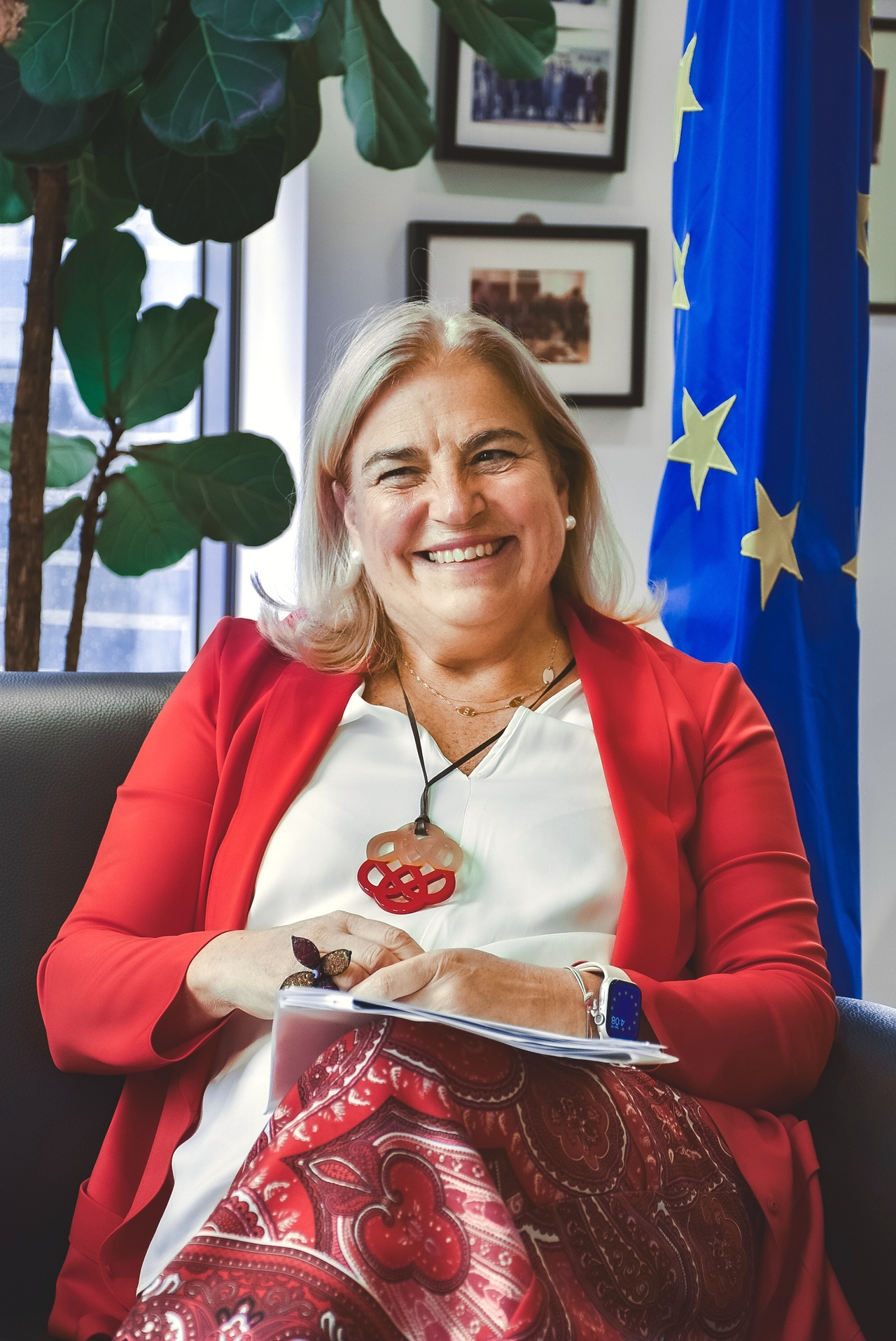
Q. What challenges have you faced as a female ambassador, and how have you overcome them? Do you believe female representation in diplomacy and politics has improved globally?
As a mom of three children and as a career woman, it was not easy to balance family life and work. However, the European Union provided good infrastructure so I could choose to continue my career. Without support systems, such as kindergarten, afterschool classes, it would have been very challenging for me to continue choosing career.
I believe the EU is a good example of female representation. We have Ursula von der Leyen as president, Kaja Kallas as High Representative and Vice-President in the leadership for 2024-2029. Besides, the EU integrates gender equality as an important evaluator for all policies and projects. Therefore, the EU, we have been making good progress in equal representation of gender. However, in terms of decision-making, we continue to see more women working on social protection or education, and less in defense, security, or even in foreign policy.
Globally speaking, we still need to make more efforts to promote and implement gender equality. In challenging times like now, we need all voices to prevent and manage conflicts. That is the only way for a more secure society. In other words, we need more women in decision-making, in leadership, in diplomacy, in security and in politics.
Therefore, I advocate that we need more local authorities, governments, businesses and institutions to develop support system and infrastructure for all women and men to make choices for their career and family. We need such environment where individuals have options to both choose, not one or the other.
Q. What policies or social campaigns have been promoted in your country to improve women’s rights and leadership?
Gender equality is a core value of the EU and a universally recognised human right, as well as an imperative to well-being, economic growth, prosperity, good governance, peace and security. All people, in all their diversity, should be free to live their chosen life, thrive socially and economically, participate and take a lead as equals.
Therefore, the EU is creating infrastructure and environment where individuals, regardless of their gender can make choices. The EU is a global front-runner in promoting gender equality as a key political objective of its external action and common foreign and security policy, aimed at accelerating progress towards global goals including the Sustainable Development Goals at the core of the 2030 Agenda. The EU pursues a three-pronged approach, combining gender mainstreaming, targeted actions and political dialogue.
The EU Gender Equality Strategy delivers on the von der Leyen Commission’s commitment to achieving a Union of Equality. The Strategy presents policy objectives and actions to make significant progress by 2025 towards a gender-equal Europe. The goal is a Union where women and men, girls and boys, in all their diversity, are free to pursue their chosen path in life, have equal opportunities to thrive, and can equally participate in and lead our European society.
In 2022, the European Commission adopted a series of directives and strategies aiming at a better representation of women in the economy and addressing women's underrepresentation in the labour market. It includes the Work-Life Balance Directive, to better balance their work and family lives and to encourage a better sharing of caring responsibilities between women and men, and Directive for Gender Balance on Corporate Boards, which requires large-listed companies to attain at least 40 percent of the underrepresented gender in their supervisory boards of listed companies, or 33 percent among all directors, the Directive on pay transparency addressing gender-based pay disparities and unconscious bias by providing transparency on pay and on pay gaps.
On the Directive for Gender Balance on Corporate Boards, it was a long exercise, but the Commission pushed and succeeded – to unblock EU legislation that was stuck for ten years. As Ursula von der Leyen said “I believe we can break these gender biases, when we enable enough women to actually reach the top and lead. This is a big first success, but there is still work to be done."
In parallel, the EU promotes women's economic empowerment and women entrepreneurship through soft law.
Examples are the online platform WEgate, the establishment of a dedicated group of experts within the Enterprise Europe Network, the setting-up of a European community of women business angels, and the launch of a gender-smart finance initiative under the Invest EU program.
Another example is the launch by the European Commission of a campaign to challenge gender stereotypes, on March 8, 2023. The #EndGenderStereotypes campaign, disseminated throughout 2023, tackled gender stereotypes affecting both men and women in different spheres of life, including career choices, sharing care responsibilities and decision-making.
While we applaud the progress made, we must remain committed to continuous improvement. This is a collective challenge and a shared responsibility. For this reason, we have to work together, the EU and the Republic of Korea to find common ways, innovative strategies and share best practices to promote gender equality.
Q. What advice would you give to young women aspiring to leadership positions, especially in international relations?
Growing networks of women exist to support each other, and I encourage young women to engage in these networks and meet other women leaders who can inspire them. Young women do not need to be afraid to stand out with confidence.
In addition, I hope they know that the EU is committed and is advocating for further gender equality in our society and globally, so whether you are women or men, you can have equal opportunities and share responsibilities.
There are growing concerns that AI gender bias reflects both technological limitations and deep-rooted societal prejudices. Despite economic and technological advancements,
Q. There are growing concerns that AI gender bias reflects both technological limitations and deep-rooted societal prejudices. Despite economic and technological advancements, what measures do you believe are necessary to bridge the gender gap both online and offline?
I fully share these concerns, as it appears to be just a logical consequence that existing biases, let them be gender or race or anything else, could be reinforced even stronger through technologies such as AI.
In Europe the risk of built-in bias is one of the risks that has been identified and addressed by lawmakers when we adopted, 2 years ago, the world’s first comprehensive AI regulation, the European AI Act.
This Act, which is gradually becoming applicable (with rules on prohibited AI technologies fully in force and enforced since February 2025), has specific rules that mitigate any potential risk of creating or reproducing gender bias.
Rather, when properly designed and used, AI systems can contribute to reducing bias and existing structural discrimination, and thus lead to more equitable and non-discriminatory decisions (e.g. in recruitment).
The AI Act sets mandatory requirements for all AI systems that we consider to be high-risk, which means systems that can pose serious risks to health, safety or fundamental rights. These systems must be technically robust to ensure they are fit for purpose and do not produce biased results, such as false positives or negatives, that disproportionately affect marginalized groups, including those based on racial or ethnic origin, sex, age, and other protected characteristics.
Under the AI Act, high-risk systems will have to be trained and tested with sufficiently representative datasets to minimize the risk of unfair biases embedded in the model and ensure that these can be addressed through appropriate bias detection, correction and other mitigating measures. That includes that these systems are traceable and auditable, ensuring that appropriate documentation is kept, including the data used to train the algorithm.
This is obviously not an easy task and there will be many questions on the way to full implementation of the specific rules, but it gives us a solid basis to build on and tools to enforce, in case we see any type of bias unfold.
But I am confident by the fact that also Korea has very recently enacted its own comprehensive AI law, the AI Basic Act, that requires businesses, similarly to our European rules to conduct risk assessments and to implement mitigation measures for AI systems.
For a special feature to celebrate International Women's Day on March 8th, The Korea Herald met with nine female diplomatic envoys in Seoul to hear their opinions on the persistence of gender inequality, AI-driven gender biases and how women's empowerment can be fully realized. -- Ed.
koreadherald@heradcorp.com




